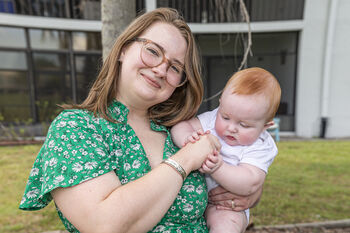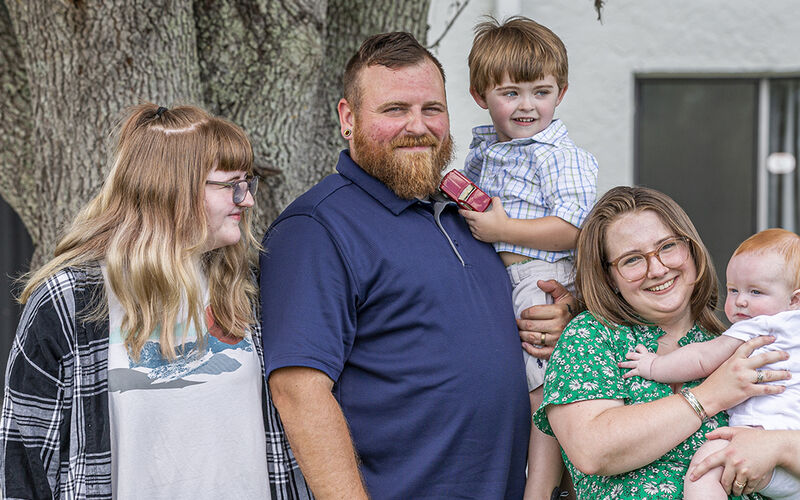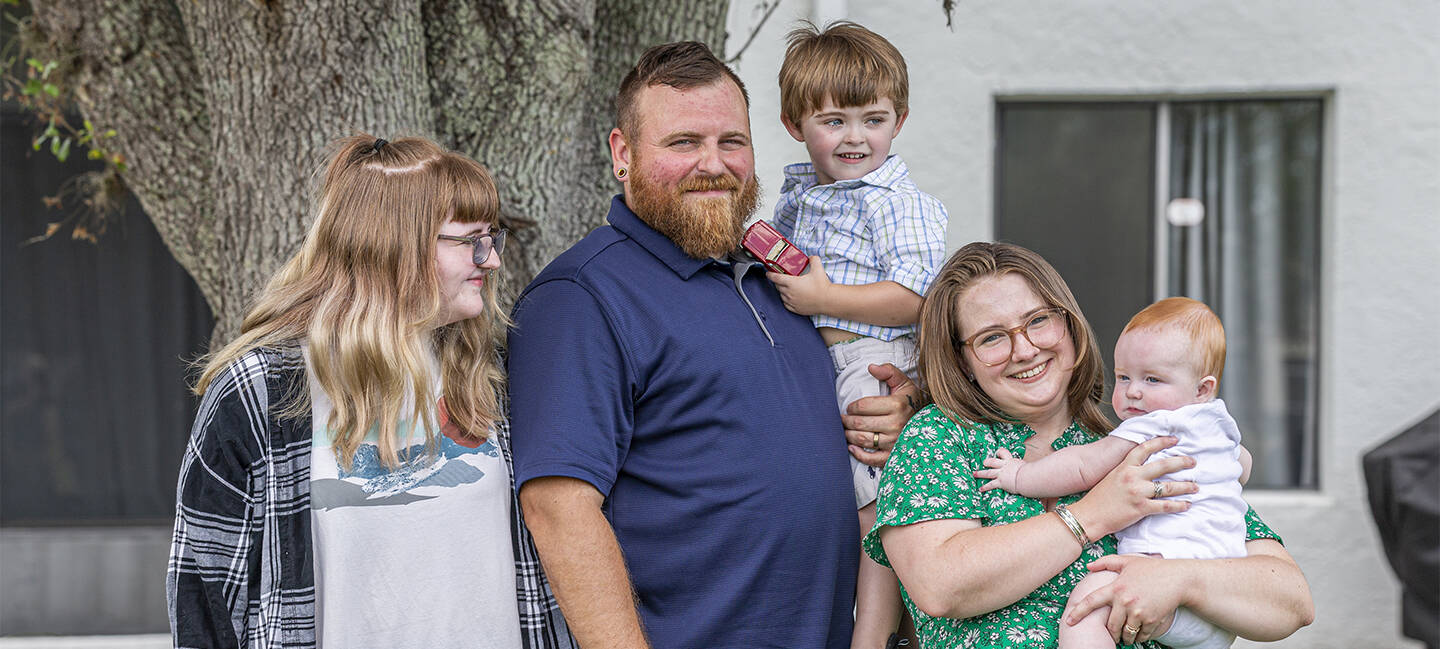Dendritic Cell Vaccines Changing Landscape for Breast Cancer Treatment
Sitting in a waiting room at Moffitt Cancer Center in May 2025, Dallas Carroll takes a deep breath. She finally has something she never thought she would: options.
It’s certainly something she didn’t feel like she had in December 2023 when she was diagnosed with metastatic breast cancer at 29, just one week after giving birth to her second son. Doctors where she lived in Alabama offered her chemotherapy, which would likely give her only five to seven years of survival.

Dallas Carroll was 29 when she was diagnosed with stage 4 metastatic breast cancer. She had just given birth to her son, Dakota.
A second opinion at Moffitt led her to an experimental trial for patients with metastatic HER2-positive breast cancer. The trial involved harvesting dendritic cells from the blood to create a personalized vaccine. Dendritic cells are a special type of immune cell that boosts immune responses by highlighting breast cancer cells for the immune system to attack. They are combined with HER2-positive proteins in the lab to recognize and target the cancer and are then injected directly into a patient’s primary breast tumor.
The immunotherapy treatment has shown to not only shrink the breast tumor but also target metastases around the body. It gave new hope to patients like Carroll with advanced-stage HER2-positive breast cancer who usually get bounced around from treatment to treatment until the disease becomes resistant to all therapies.

Brian Czerniecki, MD, PhD
“The idea is to cure these patients instead of turning it into chronic disease,” said Brian Czerniecki, MD, PhD, chair of Moffitt’s Breast Oncology Department.
A year and a half later, after three rounds of the vaccine and a round of chemotherapy, Carroll was given an option that is unheard of for metastatic breast cancer patients: surgery. Her bone and liver metastases are gone, and her breast tumor had shrunk from around 12 centimeters to just 2 centimeters.
“For the first time, I am excited. We are almost done,” Carroll said. “These are options I never thought I would have.”
In July 2025, she underwent a left breast mastectomy.
Carroll is one of two women with metastatic HER2-positive breast cancer who responded well to the immunotherapy treatment. Moffitt breast oncologists and researchers are now investigating other applications for the dendritic cell vaccine, including using it earlier in treatment and in other breast cancer types.
Earlier Stage HER2-Positive Breast Cancers
While survival rates for HER2-positive breast cancer have improved thanks to HER2-targeted therapies, chemotherapy is still a required part of treatment, which brings many unwanted side effects.
Moffitt launched a study to investigate if a dendritic cell vaccine could enhance immune response and potentially reduce or eliminate the need for chemotherapy in patients with stage 1-3 HER2-positive breast cancer.

The phase 1 trial results show HER2-targeted therapies combined with a dendritic cell vaccine before deescalated chemotherapy was safe and well tolerated. Breast MRIs taken throughout the course of treatment showed nine of the 12 patients had objective responses (three complete responses and six partial responses) and the remaining three with stable disease. Seven patients had a complete pathologic response following surgery.
Because the trial had such good results, principal investigator Heather Han, MD, received a $1.5 million grant from the Florida Department of Health to open a new arm of the trial, investigating the effectiveness of the dendritic cell vaccine alone without chemotherapy. She hopes to enroll 26 patients who will receive only the vaccine and HER2 antibodies prior to surgery.
“Successfully eliminating the need for chemotherapy has the potential to change the future of breast cancer outcomes by improving the well-being of patients while they are undergoing treatment and ultimately lowering their risk of metastatic recurrence and death,” Han said.
Triple-Negative Breast Cancer
Triple-negative breast cancer is an aggressive form of breast cancer that does not have estrogen receptors, progesterone receptors or overexpression of the HER2 protein. This makes hormone therapy and medicines that target HER2 protein receptors ineffective treatment options, and about 40% of patients still have residual disease after initial treatment in the early stage setting.

Hatem Soliman, MD
Hatem Soliman, MD, is leading a pilot study using the dendritic cell vaccine in these patients. In the study, a sample of the residual tumor removed during surgery is sent to the lab for genomic sequencing to detect unique protein mutations and create a personalized vaccine.
“We inject it into their lymph nodes as part of this mop-up strategy to activate the immune system to hunt down the residual cancer cells that harbor these targets,” Soliman said. “They will circle around and hunt for the tumor cells outside of the breast. By eliminating these cells, we hope to prevent breast cancer recurrences and increase cure rates.”
Another trial, called the Decipher trial and led by Ricardo Costa, MD, is investigating if low or ultralow levels of HER2 or HER3 proteins in triple-negative breast cancer can be leveraged to create an immune reaction that enhances response to preoperative chemotherapy.

Ricardo Costa, MD
In the study, half of the patients’ dendritic cells are mixed with the HER2 protein, and the other half are mixed with the HER3 protein to create two different vaccines. The patients receive two vaccines a week injected directly into the breast tumor — a HER2 and HER3 vaccine — for two weeks. That is followed by standard chemotherapy and immunotherapy and two more weeks of injections. Some patients may then go on to have surgery.
“This is cutting-edge from two standpoints. It has the possibility of activating the immune system globally to allow for a more protected response against cancer and leading to greater chances of cure. Second, this targeted approach is relatively new for triple-negative breast cancer, which has been defined as having an absence of a target. But we are beginning to see this is not necessarily true,” Costa said.




